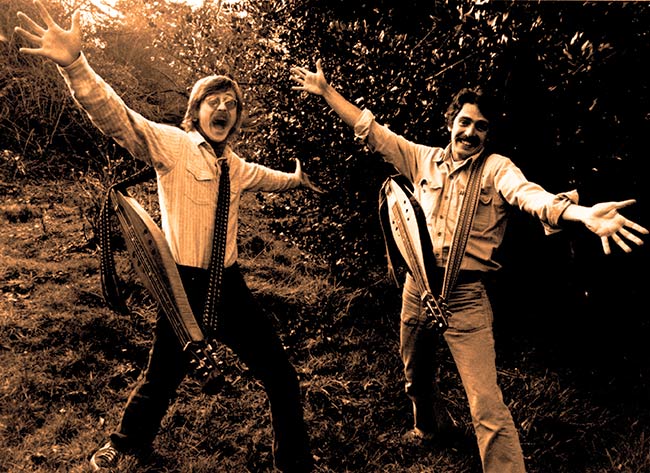Tabac Allegria
Author: Robert Force, Albert d'Ossché
Date/Studio: 1978 Kaye-Smith, Seattle, WA
Engineer: Dave Mathew
Producer: Bill Tootell
Original Release: Crossover (KM308)
Current Release: The Complete Recordings (BSR 158)
In the early 80s Albert and I had been attending a newly established folk festival put on by Elaine and Clark Weissman called the Summer Solstice Festival in Beverly Hills, CA. Its unique location was at the Greystone (Doheny) Mansion, then leased by the American Film Institute. Many lifelong friendships were entered into during those times-- notably those with Cathy Traut, Cal and Cindy Gravatt and Randy Wilkinson, all seminal members of the very fun, very talented Chinchilla Band.

Clark and Elaine decided to make an overground scene for folk music in Los Angeles and had chosen this very central, well-known location to do so. With the support of many locals the festival eventually grew into the California Traditional Music Society, having almost a 20-year run before it ceased. The festival not only attracted leading musicians of the time but also gathered the support of influential, folk-music-oriented people such as the hosts of KPFK's Folkscene radio, Roz and Howard Larman.
Elaine was a talented networker. One year Al and I showed up at the festival and were asked by her if we would be part of a money-raising effort for the Los Angeles Philharmonic Orchestra. She had promised the organizers of the event she would have some of her performers sit in, at no cost of course. It was, after all, a benefit. “Sure,” we both agreed. Why not? Besides, it would a hoot to be folk musicians tapped to raise money for the symphony.
It was a good-sized crowd for a Saturday morning. While we waited in the wings, Ed McMahon and Zsa Zsa Gabor came on stage to introduce us. Zsa Zsa delivered a variation on one of her standard bits, “My 7th husband used to play the dulcimer”. Ed was her straight man with, “Uh huh” and “Oh really”. Zsa Zsa went on to spin some unlikely, droll tale that eventually got a good laugh and we were on. It was all in a days work; such was the nature of the times. I do look fondly upon that experience.
The only performance I ever missed in my life was at a folk club in San Diego. I was running a temperature of 102 during a concert the night before in the Weissman's home. Elaine had me lie down between sets and be looked at by an attendee who was a doctor. He said, “As a fan of folk music I am thrilled to be here listening to you. As a doctor, I feel guilty. I am appalled you are even out of bed!” The next day Elaine kept me in bed and fed me chicken soup. Al went off to do the concert alone.
With the enforced layover I got to know Clark a little better. He was a computer engineer. This was back in the days when computers were the size of football fields. We got to talking about bits and bytes, how many of them could be assigned a value if used to record music (not done then!) and how many it would take to make a million-bit song. Al and I had been playing a tune we wrote and named after the so-called “happy tobacco” used by an Argentine friend we knew in Munich, Roberto Détrée. Quite lively and uptempo, we decided it would be a good candidate for the million-bit tune.
Since we play double-stringed instruments we assigned one bit to the value of one note, another to the variation of the second (unison), the difference between them and the sum of both of them. We then multiplied that by six for one dulcimer and twice again that sum the second instrument. That gave us the number for one strum. Left to figure was how many strums it would take (computers don't care what note it is). The answer was that Tabac Allegria played for one minute was a million-bit tune.
40-years later, no doubt there are better ways to compute this. But for then, we were confident we had the million-bit tune. On Crossover it is 63 seconds. That's after the Shona language, Ndau dialect count-in, “posa, piri, tato, china” we did to honor our Zimbabwean marimba accompanist, Dumi Maraire. Oh well. Once we were timed at the Eugene Country Fair as having done it in 54 seconds.
